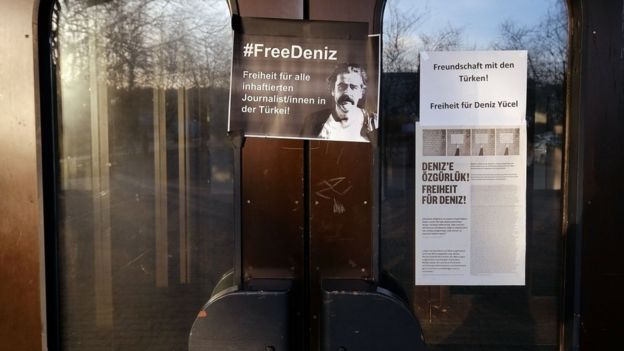Turkey's president has compared German officials to Nazis, in the latest escalation in a war of words.
Recep Tayyip Erdogan hit out after German authorities cancelled rallies designed to woo ethnic Turkish voters in Germany ahead of a key referendum.
"Your practices are not different from the Nazi practices of the past," Mr Erdogan said.
About 1.4m Turks in Germany can vote in the April referendum, which could give Mr Erdogan sweeping new powers.
Voters will be asked whether they back a new constitution, which would transform the country from a parliamentary republic to a presidential one.
That would give Mr Erdogan, as president, new powers over the budget, appointment of ministers and judges, and the power to dismiss parliament, among others.
Mr Erdogan has come under intense international criticism amid a far-reaching crackdown on his opponents since a failed military coup last year. Dozens of Turkish journalists and writers have been arrested, and a large number of diplomats and soldiers have sought asylum elsewhere.
Against this background, Turkey is targeting the millions of expatriate voters eligible to cast a ballot in the controversial poll - including the 1.4m in Germany.
However, officials have withdrawn permission for rallies in Gaggenau, Cologne and Frechen.
The Gaggenau authorities said there was insufficient space for the rally, while Cologne officials said they had been misled about the purpose of the event.
Addressing the German authorities at a rally in Istanbul on Sunday, Mr Erdogan said: "I thought it's been a long time since Germany left (Nazi practices). We are mistaken."

The cancellations of the rallies in Germany came as a German-Turkish journalist was detained in Turkey, accused of being a member of the outlawed Kurdish militant group PKK.
Mr Erdogan has called the journalist - who works for well-established German newspaper Die Welt - a "German agent" and accused Germany of "aiding and harbouring terror".
German officials said such allegations were absurd.
The BBC's Mark Lowen in Istanbul says many see in the president's rhetoric an attempt to win the support of Turkish ultranationalists before the referendum. But in the process, he says, a vital relationship between two countries - Nato partners and major trading allies - has reached a new low.
Separately, the Austrian chancellor has called for an EU-wide ban on political campaigning by Turkish politicians.
"A collective EU response to prevent such campaign events would make sense so that individual countries like Germany where appearances are forbidden don't end up being pressured by Turkey," Christian Kern told German newspaper Welt am Sonntag.
He also said the decades-long talks over Turkey joining the EU should be abandoned because the country has been "trampling on human rights and basic democratic rights".
"We can't continue negotiating about membership with a country that has been distancing itself from democratic norms and rule-of-law principles for years."
Austria has previously said Mr Erdogan cannot campaign in the country over the referendum.
Source:BBC

Comments